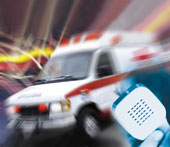 |
| Dashing off: The helpline staff provide you with ambulance service numbers |
It was a little before midnight on Sunday, February 8, when the attack happened. I had spent the morning spring-cleaning. Removing cobwebs from corners of rooms, shaking out dust from curtains and carpets, cleaning ashtrays, dusting bookshelves, sweeping. In my enthusiasm to clean house, I forgot completely about my asthma. The attack reminded me.
By afternoon I started to feel breathless. Ascribing it to a minor case of dust allergy I decided to ignore it. Nothing that a steaming cup of herbal tea wouldn’t take care of, I told myself. Unfortunately, by late evening, I was gasping for breath.
Dragging myself to the medicine chest in the bathroom, I fumbled for a medicated inhaler, which provides temporary relief in times of breathing difficulty. But because my attacks are infrequent, I didn’t remember to stock up on the Asthalene.
Frantic, I called up the family doctor and reached his voice mail. “Sorry I can’t take your call right now,” it said to my horror, “please leave a message”. I did.
Alone in my house on the outskirts of the city — where I didn’t have a hope in hell of finding a medical store which would be open at this hour, far less a doctor — I was not just breathless but clueless about what to do.
Then, suddenly, as if by the instinct to survive, I remembered jotting down a phone number of a newly opened healthcare hotline in the city. I found the chit of paper and dialled the toll free number — 1600335533.
Accustomed to being cynical about the efficiency of such services in the city, especially those conducted over the telephone and that too at this unearthly hour, I was shocked, pleasantly, to find that the call was answered on the first ring. “Nomoshkar,” greeted the male voice on the other end in Bengali, “you’ve reached the control room”. I told him my problem and asked if he could help me.
“Under the circumstances, you should immediately get to a hospital,” he told me. The tone was friendly. He provided me with several phone numbers of private ambulance services. Though disappointed that he didn’t arrange for the ambulance himself, I was thankful for the numbers. He also informed me that the nearest hospital for me would be P.G., adding, helpfully, that beds were available, if I needed to be admitted.
I asked whether he could refer me to a doctor. This, he said, he wouldn’t be able to do as he was not aware of which doctors were on duty, “but once you reach the emergency ward, you’ll be taken care of,” he reassured me.
He took down my name and said “Nomoshkar” again. I thanked him and hung up. I didn’t have to call up the ambulance after all … thankfully, the family doctor called back and arranged to have my medicine sent over.
But I’m still glad I called up the hotline. It gave me an opportunity to check out the new service. And though put to this fairly difficult test, it didn’t really take my breath away for its consumer-friendliness. In a city starved of proper guidance in terms of medical assistance, the service certainly comes like a breath of fresh air.
At your service
The hotline, a state government undertaking, was started in the city on January 26 and is located at Nil Ratan Sircar (NRS) Medical College and Hospital. According to health minister Surya Mishra, the project was in the pipeline for sometime. “We have been meeting with Calcutta Telephones for over a year to work out the logistics”. The service has two divisions — a control room, which is open to the public for making enquiries relating to hospitals and healthcare, and telemedicine, which allows doctors from districts to consult medical experts in the city, often through video-conferencing. At the moment, 19 men and women man the control room.They comprise personnel from civil defence and include several doctors and nurses. According to Dr Kusum Adhikari, assistant director of health at NRS, so far the services include giving advice and information on the following: hospitals nearest to patients’ area of residence (though at the moment only government hospitals are included in this list, duty officers can also refer nearby private nursing homes or hospitals) availability of beds, approximate cost availability of oxygen, availability of blood and location of blood banks.
In emergency cases, such as heart attacks, doctors can advise on course of action and temporary medication. If no doctor is available at the control room (they are not usually present during the night shift — which is from 9 pm to 8 am), the patient is provided with numbers of doctors they can contact.
What the helpline doesn’t provide: there is no system of home-delivery of medicines, ambulances, paramedical staff or doctors. Though the duty officer provides phone numbers of private ambulance services, he/she doesn’t usually call up the ambulance on your behalf, unless, says Adhikari, it’s a massive emergency. Information about availability of ambulances is also not part of the service — medication is generally not prescribed over the telephone, unless it’s an emergency and a doctor is on duty who can advise.










